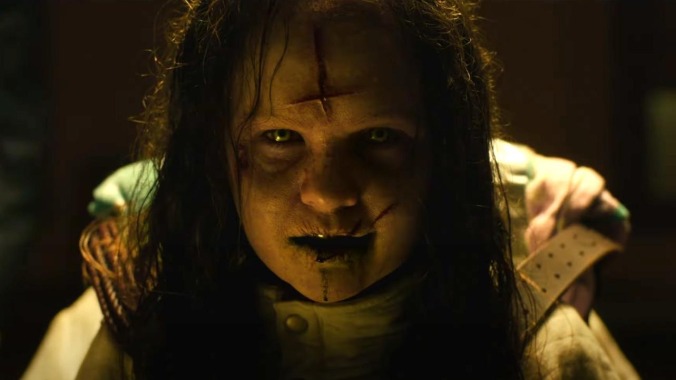The Exorcist: Believer review: What the devil is going on here?
Halloween director David Gordon Green’s latest franchise reboot is full of ideas—but they don’t add up to an actual movie

Legacyquels—sequels that come out decades after their original predecessor with the promise of recapturing its magic—are in no short supply these days, particularly in the horror genre. But how does one hop onto this trend with The Exorcist? The 1973 classic has never taken particularly well to franchising; it contributes more to the horror genre as the progenitor of imitators than as the first chapter in a serialized narrative. The Exorcist: Believer is an attempt by writer-director David Gordon Green and co-writer Peter Sattler to not only build upon the foundation of the original film, but to spark a new trilogy in the vein of Green’s recent Halloween revival. What a shame then that it’s never quite clear what they’re actually building toward.
Believer starts promisingly enough, with 13-year-old Angela (Lidya Jewett) and Katherine (Olivia O’Neill) wandering in the woods with the intent of ritualistically communing with Angela’s late mother, who died when Angela was born. The pair disappear for three days, only to reemerge with no memory of where they were and exhibiting increasingly disturbing behavior. Angela’s father Victor (Leslie Odom Jr.), a man who left faith behind with the death of his wife, is at a loss for how to deal with his daughter’s disappearance, erratic behavior, and self-mutilation, which of course turns out to be demonic possession.
This sums up approximately the first half of the film, which acts as a slow-burn character study that does a decent job of giving Victor a chance to explore his grief although virtually none of the other introduced characters are given any dimension or substance. Katherine’s evangelically religious parents (Jennifer Nettles and Norbert Leo Butz), their pastor (Raphael Sbarge), spiritualists Stuart (Danny McCarthy) and Dr. Beehibe (Okwui Okpoksawili), and Catholic Father Maddox (E.J. Bonilla) all hover at the periphery but none could be said to be a character beyond their dedication to their respective spiritualities. Even Katherine has next to no established character prior to her possession, and Angela is barely more than a prop for her father’s grief. The closest the film comes to a fleshed-out supporting character is Ann Dowd as a novitiate-turned-nurse whose backstory holds some unintentional comedy for how it implies God’s machinations, but it’s hard to credit the film for being entertaining by stumbling into absurdity.








































